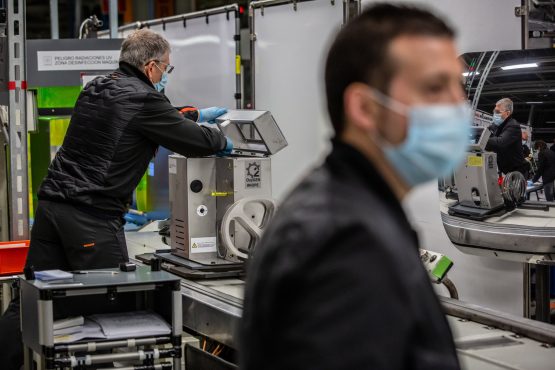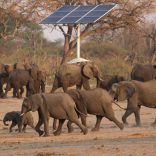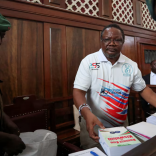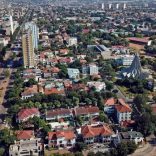Zimbabwe currency reserves backing ZiG climb to record
South Africa: Companies are ditching the ‘norm’ to respond to Covid-19 – Heeding government’s call for the speedy manufacture of ventilators locally.

In another example, Seat SA, a unit of Volkswagen AG in Spain, is using its vehicle assembly line to instead produce ventilators. [Image: Angel Garcia, Bloomberg]
Companies are responding to the government’s call to apply their skills and resources to the production of ventilators to be used in the treatment of serious cases of coronavirus disease.
Early this month the Department of Trade, Industry and Competition (dtic) issued a call for proposals aimed at identifying suitable role players to assist in the National Ventilator Project (NVP), which aims to produce 10 000 ventilators by the end of June.
A task team consisting of experts from Denel, Armscor, Eskom, the Council for Scientific and Industrial Research (CSIR) and other entities was formed to investigate designs and produce a prototype of a locally produced medical ventilator.
The dtic has tasked the South African Radio Astronomy Observatory (Sarao) to manage the national effort required for the local design, development, production and procurement of ventilators. Sarao was mandated based on the experience it gained in the development of complex systems for the MeerKAT radio telescope, a precursor to the world’s largest Square Kilometre Array radio telescope.
The design of the NVP’s non-invasive ventilator solution that clinicians agreed on does not need electricity and is instead filled with pressurised air and oxygen. It will be launched this week.
Defy and arms manufacturer Denel are among the companies that will be involved, moving away from the products they are known for and have built strong brands around.
Defy, the appliance manufacturer
Defy, which is best known for manufacturing home appliances, will be working alongside key stakeholders led by the University of Cambridge’s Open Ventilation System Initiative.
It says it will be contributing towards the project without any commercial benefit, adding that the system design consists of components it uses in the everyday production of its core appliances – which Defy CEO Evren Albaş says gives the company a “unique” advantage.
“Furthermore, Defy’s flexible manufacturing capabilities, together with the design and development expertise of the consortium with whom we are partnering, will allow us to fast-track ventilator production and distribution,” Albaş says.
Defy believes having the assistance of manufacturing company Beko plc’s Cambridge-based research and development centre – one of the seven global research centres of Defy’s parent group, Turkish-based Arçelik AS – will play a crucial role in its ability to expand the process.
“Teams are working around the clock and thanks to them, this project is succeeding insofar as our ability to optimise and coordinate concurrent engineering efforts,” says Albaş.
Denel Dynamics, the weapons company
Denel Dynamics, the defence and technology company that manufactures sophisticated missile and precision-guided weapon systems and was an early leader in unmanned aerial vehicle systems, is another of the companies taking a detour from their usual activities.
It will be working alongside Denel Aeronautics, equipment manufacturer of the Rooivalk combat support helicopter and design authority of the Oryx medium transport helicopter.
Denel Dynamics CEO Danie du Toit says engineers from both operations are already working around the clock on Project Sabela – ‘we are heeding the call’ – in partnership with other state-owned entities, research bodies and medical technology companies.
“We are still in the early stages of the project, but we are optimistic that this local initiative will help to alleviate the dire need for medical ventilators that are required in great numbers at both public and private hospitals.”
Du Toit says it is responding immediately and positively to the call by government.
“As a state-owned company, we are committed to utilising our skills, technology and experience in support of the national objectives to combat the scourge of the Covid-19 pandemic at our doorstep.”
The US is doing the same
Xerox, known for making copiers, told NBC News that it has a deal with Vortran Medical, a small medical device manufacturer in California, to scale up production of the Go2Vent, a low-cost resuscitation device commonly used by first responders in emergencies and disasters.
The companies aim to produce 150 000 to 200 000 devices a month by June and could produce as many as a million ventilators in the coming months. It projects making 40 000 ventilators this month alone. The Go2Vent has already been approved by the Food and Drug Administration in the US, has been on the market for years, doesn’t require electricity and is relatively inexpensive. Xerox plans to charge hospitals approximately $120 (around R2 200) per unit.
While the device is not a replacement for hospital-grade ventilators, it could help ease the pressure on states and health systems facing a crush of patients so severe that some hospitals have begun splitting ventilators to serve two patients at a time.
It takes off the overload on the system, so the sickest patients can go onto the ICU-grade ventilators, Naresh Shanker, Xerox’s chief technology officer, said in an interview.
He added that those displaying lower-level symptoms, whom studies show account for most Covid-19 patients, can significantly benefit from the Go2Vent, which can be set up within minutes and discarded after use by a single patient.
By Melitta Ngalonkulu












Leave a Reply
Be the First to Comment!
You must be logged in to post a comment.
You must be logged in to post a comment.